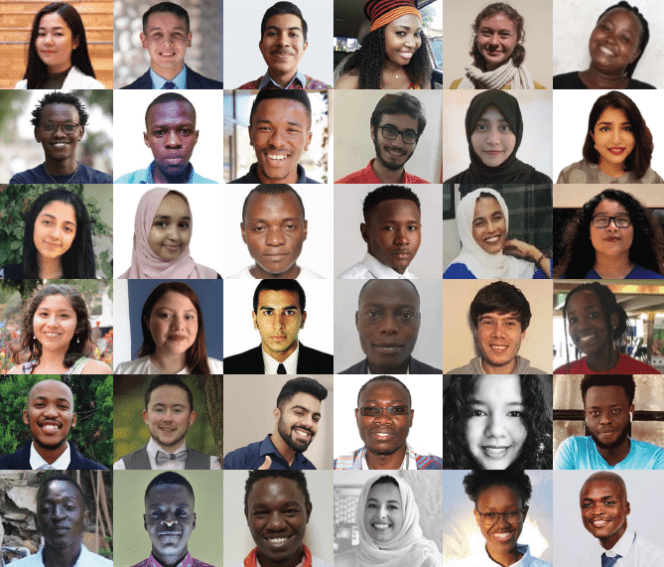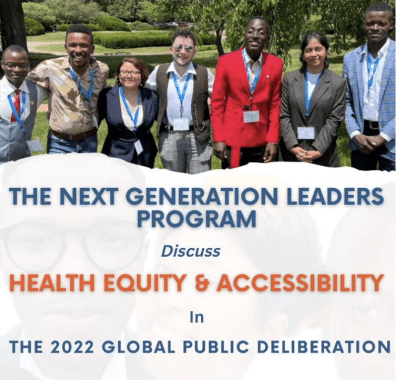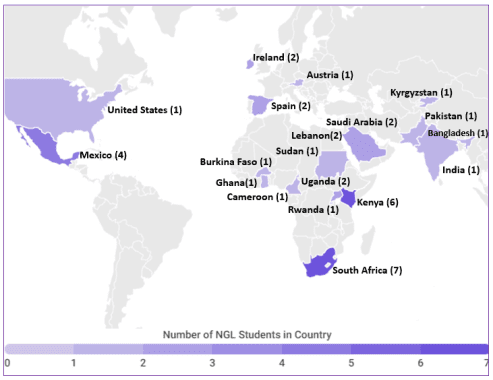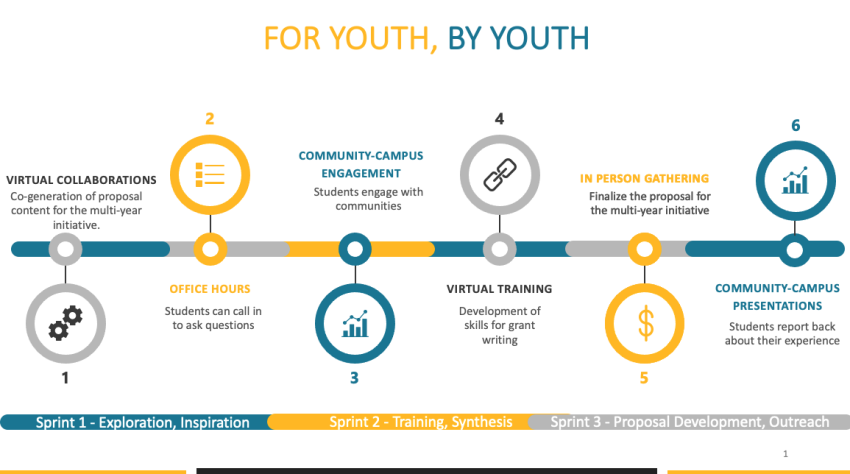Next Generation Leaders/For Youth, By Youth

The Talloires Network of Engaged Universities in partnership with the Mastercard Foundation has assembled a diverse cohort of Next Generation Leaders comprised of 36 students located in 18 countries including: Bangladesh, Burkina Faso, Cameroon, Ghana, India, Ireland, Kenya, Kyrgyzstan, Lebanon, Mexico, Pakistan, Rwanda, Saudi Arabia, South Africa, Spain, Sudan, Uganda, and the United States.
The cohort of 36 Next Generation Leaders are organized into smaller working groups, each small working group focusing on a particular civic engagement theme. These interdisciplinary and international working groups are community spaces to share strategies and ideas, form lasting collegial ties, and build momentum for the field of civic engagement. To learn more about the cohort, visit our Next Generation Leaders Directory.
With support from the Talloires Network and paNhari coaches, the cohort of Next Generation Leaders met regularly in the months leading up to the Talloires Network Leaders Conference 2021, where they presented in four sessions during the conference, focusing on themes including pandemic recovery and resilience, innovations in gender equity, structured listening methods, and the future of civic engagement. Read the Next Generation Leaders Report to learn more about the successful culmination of their work during TNLC2021 and to hear their calls to action.
Learn more about the NGL program below.
University World News Coverage
The Next Generation Leaders have been featured in 11 University World News articles between 2021 and 2022. The articles cover a wide variety of NGL activities: one article covers a webinar hosted by students entitled "Peace/Not War," which focused on the experiences of students based in conflict zones including Cameroon and Sudan; another article focuses on a discussion between the structured listening group and Tisch College Dean Dayna Cunningham on how the “awareness-based systems change approach” (A-BSCA) applied to their struggles against racial and other injustices. The discussion was based on an article by Dean Cunningham on A-BSCA’s emphasis on looking at the world with an open mind and heart.
Deliberative Pedagogy
In partnership with the Kettering Foundation, the alumni of the NGL program convened online to practice structured listening methods, including critical steps such as naming and framing controversial public issues. In July 2022, nine NGL students from eight countries travelled to participate in the Kettering Foundation’s Deliberative Democracy Exchange (DDex) in Dayton, Ohio, to begin designing their next collaborative experiment in public deliberation. Their collaboration continued following the exchange and culminated in an online global deliberative forum for Network members. Learn more about the gathering of Next Generation Leaders at the July 2022 Deliberative Democracy Exchange in Dayton, Ohio.
 On December 14, 2022, alumni of the Next Generation Leaders program hosted a Global Deliberative Discussion using structured listening methods, including critical steps such as naming and framing controversial public issues, to discuss health equity and access. The student-led discussion explored the question: How can we achieve accessible healthcare for all at the best cost, with the best choices, and without stigma? This discussion was free to the public and explored three varied options that express common concerns and offer trade-offs.
On December 14, 2022, alumni of the Next Generation Leaders program hosted a Global Deliberative Discussion using structured listening methods, including critical steps such as naming and framing controversial public issues, to discuss health equity and access. The student-led discussion explored the question: How can we achieve accessible healthcare for all at the best cost, with the best choices, and without stigma? This discussion was free to the public and explored three varied options that express common concerns and offer trade-offs.
Students began the session by providing a brief overview of the subject and then invited participants to join two breakout rooms. NGL alums facilitated the small group discussions based on two possible solutions, with possibilities for a third option that would present a compromise. Learn more about the deliberation by reading the Health Equity Issue Guide PDF, created by NGL alums.
For Youth, By Youth

A map of the distribution of NGL alumni.
The Talloires Network is a growing global coalition of engaged universities who are collaborating with communities and partners to confront societal challenges such as disease, famine, structural racism, gender oppression, economic inequality, climate change, and political polarization. In solidarity, we are building a global movement of civically engaged universities. Next Generation Leaders alumni, the paNhari team, and the Talloires Network of Engaged Universities will work together in 2023 to ambitiously expand the Next Generation Leaders Program through the “For Youth, By Youth” initiative with support from the Mastercard Foundation.
Students will organize and hold local community-campus events, providing an opportunity for NGL alumni to engage with their immediate communities using a "pre-mortem" approach to identify the real issues youth face. Each NGL alum will organize at least one event to gather insight about the issues young people see, firsthand, as the most pressing problems in the world by thinking backwards about a failed world sometime in the future, and what could have led to that failure. These events can range from a meeting of peers to discuss these issues, to a presentation, or a workshop. The issues identified during the event will be noted and used to inform discussions at an in-person international gathering in August 2023.
Read the student community-campus event reports below:
- Central European University (Austria)
- University of Cape Town (South Africa)
- University of Lay Adventist of Kigali (Rwanda)

For Youth, By Youth Timeline
Next Generation Leaders Presentations
Next Generation Leaders presented during four sessions at the 2021 Talloires Network Leaders Conference, focusing on themes including pandemic recovery and resilience, innovations in gender equity, structured listening methods, and the future of civic engagement. Watch the recordings of each session from TNLC2021 below!
Pandemic Recovery and Resilience
The COVID-19 pandemic was unprecedented, and its effects reverberated through every part of the globe and in every sphere of life.Many questions were raised throughout society about how to recover from the pandemic, and what needs to be done to prepare for a similar future occurrence.This working group had the opportunity to unpack these difficult topics of pandemic recovery and resilience, examining university civic engagement strategies across the world.Together they explored the diverse types of “resilience” (economic, political, social, cultural) in relation to pandemic recovery, their work culminating in the documentation of the ways students and communities can respond and adapt to public health and related crises.
Innovations in Gender Equity
Despite the strides that have been made throughout history, gender inequality remains an issue in the world today.These inequalities have been exacerbated by the COVID-19 pandemic, with statistics showing a stark increase in gender-based discrimination, violence, and the lack of equitable access to social and economic opportunities.This working group discussed strategies to address these disparities and discrimination due to gender, with a particular focus on the issue of climate change.The group’s conversations highlighted the role of gender in the policy and practices of universities, as well as the role of universities and students in advocating gender equity in collaboration with local leaders and community partners.
Structured Listening Methods
Individuals must consider multiple perspectives to work together to address societal problems and take collective action.With some exposure to the Kettering Foundation’s approach to public deliberation, this working group explored the issues related to climate change in the context of developed and developing economies.The students, who come from diverse backgrounds, took this opportunity to dive into the range of information about this global challenge and discuss the several varieties of actions possible in different contexts.The group also examined the benefits of public deliberation as a structured approach for having productive conversations across differences.
Civic Engagement Futures
The COVID-19 pandemic affected access to education as many countries around the world implemented national lockdowns to curb the spread of the virus.These measures saw educational institutions shift to remote learning in an effort to continue educational pursuits despite the health crisis.These measures, however, brought into question the inequitable access to digital learning tools and equipment among students.The Civic Engagement Futures working group considered the future of learning, teaching, and research, and ways universities can be active and positive forces in their communities.Students in this working group also discussed how they were able to successfully connect their academic interests to real-world issues as well as the systemic barriers that hinder their ability to collaborate with communities.